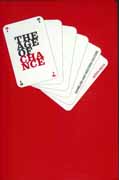
The Age of Chance
The author examines gambling's enduring appeal, exploring its complex relation to our underlying conceptions of the world, and to the social and cultural backgrounds of those who fall under its spell. Using a wide range of sources, she traces the origins of gambling in the ancient world and follows its manifestation in games as diverse as the patolli of the Aztecs and the Internet gambling of today. From an analysis of social structure, she goes on to consider the subjective experiences and attitudes of individual players, discovering some remarkable continuities: the same deliberate seeking out of risk, a disregard for money and a variety of superstitious beliefs in luck and Destiny seem to typify gamblers throughout history and across cultures.
This fascinating and extensive study, enlivened by interviews with British and American gamblers, will be interesting reading not just for those interested in the cultural and social implications of gambling - researchers in sociology, cultural studies and the history of ideas - but for anyone interested in how we create meaning in an increasingly insecure world.
207 pages, paperbound, April 2006.
Why People Gamble and Its Colorful History
 Howard Schwartz, the "librarian for gamblers," is the marketing director for Gambler's Book Club in Las Vegas, a position he has held since 1979. Author of hundreds of articles on gambling, his weekly book reviews appear in numerous publications throughout the gaming industry. Howard's website is www.gamblersbook.com "action" and how games help can help players escape from reality and create "states of ecstasy" while at times nurturing feelings of self-discipline, courage and integrity. The two books below alone could be a micro-curriculum for understanding gambling and it's place in human nature.
Howard Schwartz, the "librarian for gamblers," is the marketing director for Gambler's Book Club in Las Vegas, a position he has held since 1979. Author of hundreds of articles on gambling, his weekly book reviews appear in numerous publications throughout the gaming industry. Howard's website is www.gamblersbook.com "action" and how games help can help players escape from reality and create "states of ecstasy" while at times nurturing feelings of self-discipline, courage and integrity. The two books below alone could be a micro-curriculum for understanding gambling and it's place in human nature.The Age of Chance (Gambling and Western Culture) by Gerda Reith (207 pages, paper bound, $38.95) and You Bet Your Life (The Burdens of Gambling) by Neil Isaacs (274 pages, hard bound, $29.95), analyze the subjects, from psychological, sociological and historical perspectives. Each author takes a different approach in helping understand why gambling has always been part of human nature, how it has evolved over the centuries in different cultures, the dangers in losing control and how the games have been modified for different generations.
Reith, a lecturer in sociology at the University of Glasgow (Scotland), looks at the origins of chance and fate; examines the theory that there is no such thing as chance; discusses risk then isolates the various games and why people are attracted to certain forms of play. Going back several hundred years, the author looks at people's fascination with numbers and how casinos nurtured the games which attracted players. Perhaps the most interesting sections discuss "the experience of play" including factors like excitement, the impact of boredom and our need to escape from it.
The subject of luck-people, things, places, times and numbers gets appropriate attention from Reith. With a dozen pages of references and resources and a name and subject index, this is a marvelous resource for anyone planning to study the phenomenon of gambling and why people continue to risk their money and time on the games.
Neil Isaacs, if the name sounds familiar, co-authored the classic Covering the Spread 31 years ago with Gerald Strine. A lifelong gambler himself, he is also a licensed specialist specializing in the treatment of problem gamblers. The book is written with the skill of a novelist, humanizing the subject of compulsive gambling and may help anyone better understand the gambling culture along with the history, psychology and literature of play. In a dozen chapters Isaacs discusses the compulsion to lose, and factors like anxiety, depression and psychosis, addiction, diagnosis and treatment.
Packed with a detailed bibliography and a well-done index of names and subjects, it too becomes a time-saving, important reference for anyone trying to understand the phenomenon of gambling, its dangers and how it affects millions of people daily.
